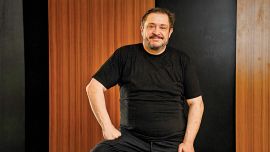If at least one reader (Adrián Insaubralde) appreciated this column kicking off with Macbeth quotes a fortnight ago, why not repeat the dose today with the headline? Yet the tomorrow now ahead of us on the eve of the presidential run-off is a very different beast to the Scottish monarch’s existential dirge – instead of “creep in this petty pace,” this tomorrow will come hurtling down upon us like an onrushing express train blocking out any light at the end of the tunnel with the questions only just beginning once the winner is known.
Tomorrow always comes, they say (although also never comes) but there is at least one case of somebody giving it the slip via the famous Macbeth quote. Around a century ago an Indian civil service clerk ran across the Thane of Cawdor in Urdu translation and, highly impressed, resolved to give it a wider readership, mindful that not all Indians speak Urdu (especially not Hindus) – he therefore set about translating it from Urdu back into English as the common language of British India. But it would seem that Eastern philosophy has extremely elastic concepts of time because in his translation “tomorrow and tomorrow and tomorrow” came out as “yesterday and yesterday and yesterday.” Not an entirely pointless anecdote in this electoral context because all too many people in various senses and ways are seeking to use tomorrow to bring back yesterday.
‘Yesterday’ was arguably the most popular song of the monumentally popular Beatles (to whom some media were comparing the overrated Taylor Swift last week but not a patch). Around the same time there was a minor hit called ‘Tomorrow’ by Sandie Shaw. This song is about a girl who has decided to break up with her trusting boyfriend at their next meeting because she has “someone new” and each verse ends with the line: “And I don’t like what I must do tomorrow.” Sandie Shaw is surely speaking for a huge percentage of the Argentine electorate at this moment.
Anybody still reading this must surely be wondering by now why this column is garbling away in this incoherent fashion. The answer is quite simple – the veda electoral curfew in force since yesterday for whom this columnist has perhaps an exaggerated respect (certainly not shared by the social media). To be absolutely on the safe side, today’s column thus proposes not even to name the presidential candidates.
If tomorrow’s run-off is taboo today, recourse can always be made to previous second rounds to fill the space but in Argentina’s case this makes for a slender volume. Democratic voting in Argentina (effectively as from 1912 with the introduction of universal manhood suffrage) ran on the basis of simple majorities until 1972 when that system was a non-starter for a military régime since it would guarantee victory for a Juan Domingo Perón (in exile since 1955) whose return they could no longer delay. In order to give themselves the faint chance of the anti-Peronist chunk of Argentine society outnumbering the Peronist masses if obliged to vote en bloc, they introduced a system whereby nothing short of an absolute majority would permit victory in the first round – failing that, the two leading candidates would square off in a second. But even denying Perón himself participation although not his party, the Peronist candidate Héctor Cámpora (after whom the current Kirchnerite youth organisation is named) came so absurdly close to an absolute majority at 49.56 percent that the run-off was called off as totally pointless.
As it happened, Buenos Aires City Mayor-elect Jorge Macri clinched an almost identical vote of 49.6 percent last month (an election we may discuss since it is over) and in that case the opposition also pulled out. Conspiracy theories as to some underhand deal between Macri and the Peronists to secure the latter’s withdrawal were muttered but not only was any further campaigning pointless (with libertarians accounting for around three-quarters of the remaining vote) – it was also in Peronist electoral self-interest to give Macri’s people one less motive to sacrifice their long weekend and to be out in force tomorrow.
The return of democracy in 1983 replaced the run-off with the electoral college enshrined in the 1853 Constitution as nominally defining the president – totally academic since the presidential majorities in the next two elections (even an absolute majority for Raúl Alfonsín in 1983 and 47.5 percent for Carlos Menem in 1989) were clear enough in their own right. But Menem not only wanted the right to run for a second term, reforming the Constitution in 1994 for that purpose – he also wanted to be ensured that second term as reflected by the new electoral rules. Mindful that the Peronist vote has averaged 40-something percent until recent years and was thus vulnerable to polarisation, Menem multiplied the ways whereby a run-off could be avoided – the absolute majority was lowered to 45 percent with even 40 percent sufficing if 10 percent ahead of the next candidate. Again the following two elections (49.94 percent for Menem in 1995, 48.37 percent for Fernando de la Rúa in 1999) were won convincingly enough to dispense with any need for subtleties.
The 2003 election should have produced a run-off between technical winner Menem (24.45 percent) and Néstor Kirchner (22.24 percent) in a fragmented race with only 10 percent separating five candidates but fearing that he might not even repeat his first-round vote, Menem chickened out. Again the next two elections (45.28 percent in 2007 and a 2011 absolute majority for Cristina Fernández de Kirchner) made any argument superfluous. So the only run-off previous to tomorrow ends up being 2015 (51.34 percent for Mauricio Macri, 48.66 percent for Peronist Daniel Scioli). As in this year one man (in that case Scioli) was widely considered the next president after the PASO primary and another (Macri) after the first round.
One final comment – the French introduced ballotage (as they call it) for both presidential and parliamentary voting, which makes for better balance. Here we are in for a president with an artificial absolute majority and a gridlocked Congress.
Anyway next Saturday no veda and a brand-new president-elect to analyse.























Comments